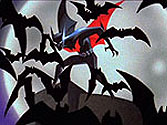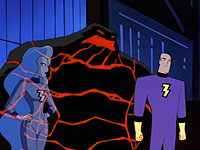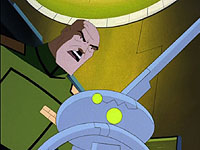|
||
|
| Credits | Cast | |
Written by Rich Fogel Directed by Butch Lukic Music by Michael McCuistion Animation by Koko/Dong Yang |
Will Friedle as Terry McGinnis Kevin Conroy as Bruce Wayne Stockard Channing as Barbara Gordon Ryan O'Donohue as Matt McGinnis Jeff Glen Bennett as 2-D Man Robert Davi as Magma Laura San Giacomo as Freon |
Corey Burton as Gen. Norman Kevin Dunn as Dr. Hodges Don Harvey as Kidnapper Fiona Landers as Girl Jan Robson as Rocketeer Leader Dave Walsh as Rocketeer |
|
But this, as I'm painfully aware, is but one person's opinion. Nor am I under the delusion that anything I say here will change a single mind out there. I repeat these things to myself (in public) to reassure myself that I am not crazy: There really is reason to think this is a great episode. Most viewers focus their dissatisfaction on the episode's antagonists, the self-styled "Terrific Trio." Certainly the Trio's personalities and powers are familiar, being borrowed with hardly any change from the venerable "Fantastic Four." But there are other complaints. The action is busy without being involving. Neither McGinnis nor Wayne do much. And what were they thinking when they gave General Norman a little Hitler moustache? One thing I'm fairly certain of: They weren't thinking of Hitler. But I'll get to that in a moment. Concentrate for the moment on the Terrific Trio themselves, and on the fact that this is one of the most blazingly inventive cartoon shows currently on. Yes, the Trio's powers and personas are suspiciously derivative. So too is their backstory: Born in an industrial-research accident that gave the victimized scientists superpowers, the Trio have been underwritten by the government to form an elite crime-fighting unit. Clang, clang, clang; all the clichés seem to drop into place. The only thing that shocks, apparently, is that Rich Fogel, a writer who knows his way around a backstory and is a member of a creative team justly praised for its fertile imagination, should fail to escape even one of this tiresomely familiar set of tropes. But then the tropes begin to topple. The Trio was originally a Quartet, and there should have been a fourth victim. But he was absent the day of the accident. Suspiciously absent. One of the Trio begins to dig, and discovers that the accident was not an accident, but a booby-trap set by this treacherous fourth with the intent of destroying a romantic rival. The government was a party to this skulduggery, and when the Trio's genes begin to disintegrate, the military moves in and tries to eliminate them. There's a word for this sort of thing, for setting up a series of easily identifiable clichés and conventions and then systematically turning them upside down. The word, boys and girls, is "satire." Bold, uncompromising, and murderous. The Trio copies the Four so closely, the better for us to recognize in the former the negative print of the latter. The essence of a superhero myth is that some person or group should be set apart from the rest of humanity and enobled by a tragedy, which both gives them superpowers and causes them to consciously choose to take on the superhero role. It's a coherent and moving story, which is why it has been repeated so often. But stories require authors, and the satire begins when we discover that the author of the Trio's story is not a Bob Kane or Stan Lee (or even Rich Fogel) standing in for a beneficent universe. The author is General Norman; apparently, if the universe won't cooperate by giving him a team of superheroes, this slyboots will manipulate some victims into volunteering for the role. Teams even of superheroes may be riven by jealousies and rivalries, but under the pressure of events such cracks always close. But here the jealousies precede and create the team. The Trio was a lie from the moment it was born, because it should have been a Foursome or it should not have been at all. Hence, its instability. In short: It's gimlet-eyed advantage and green-eyed jealousy behind this team, not the serendipity of accident. And since advantage and jealousy are more common than fortunate accident, this episode argues that superheroes are more likely to be built of crooked timber by crooked craftsmen. The Trio may copy the Four slavishly, but they are in their origins and development far more likely than the original Marvels—which is not a comforting thought. Indeed, it's not just superhero group dynamics and histories that are subverted. The script pushes the very idea of a necessary hero farther and deeper into a corner, until it becomes irrelevant to the story. Viewers complain about the passivity displayed by McGinnis and Wayne without realizing that it is the essential point: Passiveness is the opposite of action, what we expect of a hero-protagonist. So to trap our heroes in a web of passive reaction (McGinnis following the Trio about) and coincident discovery (Wayne's thoroughly unmotivated hunches being borne out) is to subvert the idea that heroism of any sort is required. Instead, the antagonists solve the problem of their own existence: They discover the true nature of their tragedy; they attempt to rectify it through revenge; they are the unwitting and unintending agents of their own destruction. With heroes like these, the episode sneers, who needs villains?
The darkness that envelopes this episode is twofold: It mocks the idea of a superhero by showing how the conventional background story can be manipulated by dark forces to serve their own ends; General Norman represents the evil that can create and pervert the gifted. Darker still, it mocks the idea of a responsible heroic agency, by showing how the forces that bring superheroes into existence can also conspire to trap them in layers of passivity. There are no heroes in "Heroes," only the playthings of malice and accident. This is an anti-hero story: Not just the story of anti-heroes, but a story that opposes the idea of heroes, a story that crushes its own protagonists. It's a sophisticated (albeit grim) attitude this episode takes, and I suspect that, subliminally at least, the real reason so many fans resist it is that they detect and resent the way it puts their favorite superhero stylistics through a meat grinder. Satire is rarely popular with fans of the satirized material, because it implies limits on that material. (Similar limitations are present in "Joker's Millions" and "Beware the Creeper," episodes that also provoke reactions ranging from the tepid to the hostile.) Too many fans pride themselves on their sophisticated preference for the "Dark Knight." But however dark his clothing and psychology, Batman is still a figure of romance and optimism. And it's the real point of "Heroes" to demonstrate that fact by contrasting him with superheroes who are trapped in genuine darkness and genuine pessimism |
|
|
|
Related Episodes |
What Others Are Saying ... |
| Back to Golem |
Forward to Hidden Agenda |

 Heroes
Heroes
